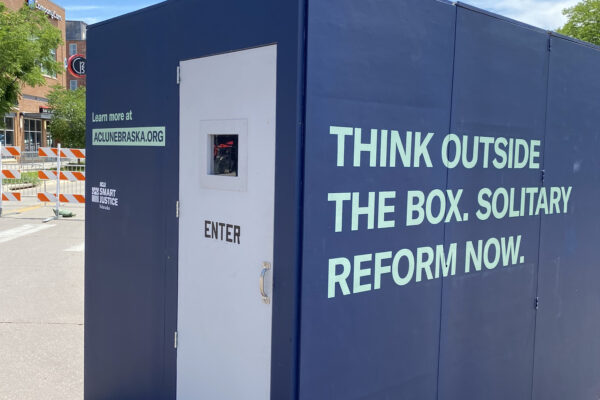Republished from Nebraska Examiner. First published on Dec. 22, 2023.
Even though we have seen some recent forward momentum on reform, Nebraska’s prison system and criminal legal system as a whole have no shortage of problems.
Our prisons are overcrowded. Recidivism, a measure of the number of people leaving confinement only to commit another crime, remains too high. And our state’s growth in both prison population and prison spending is among the highest in the nation.
Addressing these issues requires a multifaceted approach, and one policy change in particular has been missing from the public dialogue: Nebraska must stop prolonged solitary confinement.
I can tell you firsthand from my own experiences that solitary — or the hole as it is known in prison — leaves most people worse than when they entered. It also directly compromises rehabilitation. I learned from my mistakes and became a better person in spite of my time in the hole, not because of it.
Today, the Nebraska prison system’s use of solitary confinement, what it calls restrictive housing, remains too frequent despite progress in the right direction under Director Rob Jeffreys’ leadership.
The latest report available shows that prison staff confined 1,303 people in solitary for at least one day over the last year, with the average stay being about a month. In the most extreme cases, the total length of stay for some people has run more than an entire year.
Recently, Nebraska has made amazing legislative progress limiting solitary confinement both for young people in juvenile facilities and for vulnerable populations in the adult prison system, including minors, Nebraskans who are pregnant, or Nebraskans who are diagnosed with a serious mental illness, a developmental disability or a traumatic brain injury.
However, despite that law, about 450 Nebraskans held in solitary last year had a serious mental illness. The prison system rationalizes that fact by saying that these Nebraskans were stabilized by medication or another therapeutic intervention at the moment of confinement.
It is clear more needs to be done.
We hope to see prison administrators strive to understand what is enabling overuse and continue to work to address it, particularly to make sure the department is respecting the law protecting vulnerable populations. Lessons from sister states that have reformed solitary should be adopted immediately.
State senators also have a role to play. State Sens. Tony Vargas, Wendy DeBoer, Terrell McKinney, Megan Hunt and Danielle Conrad are co-sponsoring Legislative Bill 557, a bill that would enact an international human rights standard called the Mandela Rules into state law. The rules limit use of solitary confinement to no more than 15 consecutive days, reflecting the established expert consensus that prolonged solitary confinement causes deep psychological harm. We hope to see this bill get out of committee and make it into law next year.
The hole is torture. I and other solitary survivors can tell you with certainty that solitary confinement does not improve public safety or reduce prison violence — often it produces the exact opposite result. To this day, I am haunted by my time in solitary not far from the cell of a man who would go on to be convicted for committing four murders shortly after his release.
I want to be clear that people in solitary are not inherently a danger to themselves or others. The fact is that solitary hurts rehabilitation efforts.
The vast majority of Nebraskans who are locked up in our jails and prisons will come home at some point, many just a few years after they start their sentence. It makes sense to ensure that they are not made worse off while incarcerated.
There are even more immediate benefits to these changes. Nebraska can learn from the experience of our sister state Colorado, which implemented the Mandela Rules several years ago and saw immediate benefits in reduced self-harm attempts and increased correctional worker safety.
The key takeaway is that prolonged use of solitary confinement does not support public safety or any of our shared goals around it; rather, it compromises those efforts. As senators continue to work on smart justice reform, stopping solitary must be part of the conversation.
BE A SMART JUSTICE ADVOCATE
Add your name to our list of Smart Justice advocates to get updates on opportunities to engage on this issue and related topics. Together, we’ll call on officials to improve public safety by adopting proven solutions that strengthen our communities and prevent crime, not more failed policies that just mean worse outcomes for all of us.



